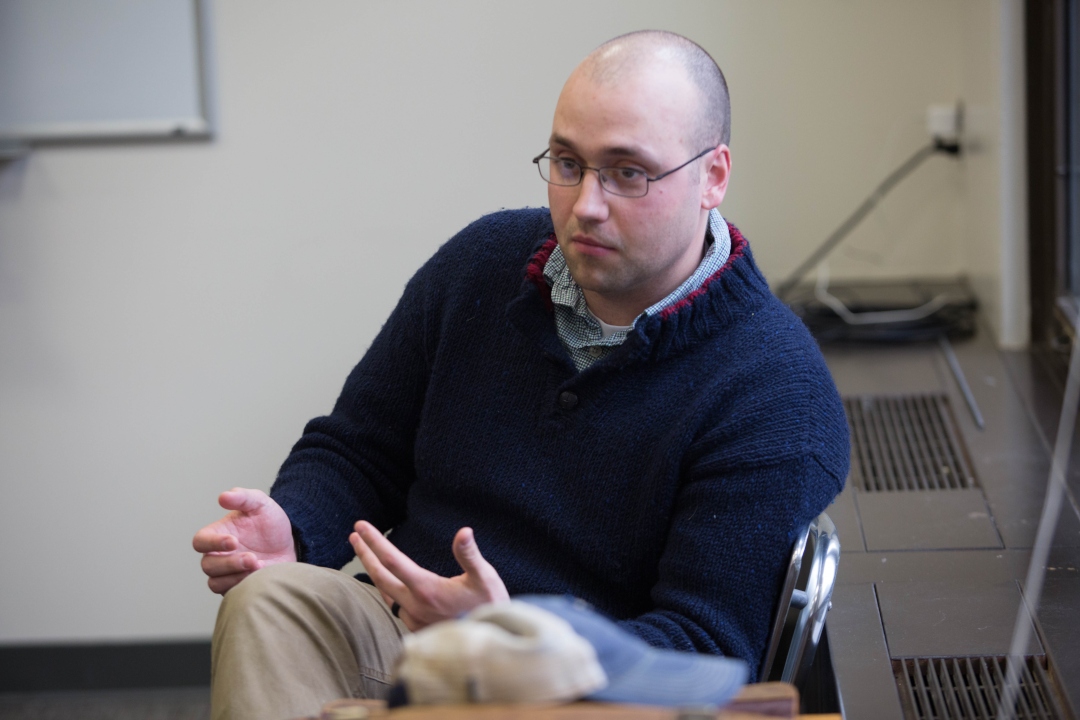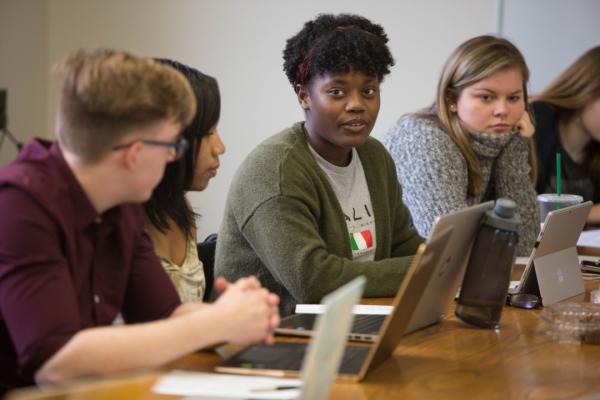In Marshal Alcorn’s Dean’s Seminar on Violence and Trauma, first-year students grapple with trauma in all of its forms. They read neuroscience studies to examine how horrific experiences alter the brain. They explore shifts in cultural perspectives, like the impact of the #MeToo movement on the way we view women’s experiences. And they look at depictions of trauma in literature, from the shell-shocked soldiers in Tim O’Brien’s Vietnam classic The Things They Carried to the childhood abuse that author Mary Karr details in her memoir The Liar’s Club.
But few lessons have captivated Alcorn’s students like the first-hand account by U.S. Army Captain Jacob Holl—an English graduate student and a veteran of two tours of duty in Afghanistan—of living in a war zone and his efforts to cope with the violence he witnessed.
“I think of telling my story as my obligation as a soldier, a teacher and just as a person,” said Holl, who plans to teach English and philosophy to cadets at the United States Military Academy after graduation. “People struggle relating to combat veterans. They want to honor our service, but they don’t know how to talk about it. I see this as a way for us to interact and learn from each other.”
Holl was invited by Alcorn—a professor of English and chair of the department—to audit his seminar this year so that students can experience a personal dimension to the topic they are debating in the classroom. When Holl describes the daily firefights he endured as a platoon leader in Kandahar or the explosion that killed a soldier under his command, students gain a window into life-altering experiences and their lingering impact.
Marshal Alcorn teaching his Dean’s Seminar on Violence and Trauma
“This course looks at the experience of trauma and the difficulty of communicating it to other people,” Alcorn said. “When Jacob talks to the students, you can see the respect and empathy between them. It goes in both directions.”
Insights and Inspirations
Alcorn first met Holl in fall 2017 while teaching a graduate seminar on trauma. A trained psychoanalyst, Alcorn has hosted major international conferences on trauma and contributed influential articles to seminal texts. On the first day of class, he asked if any students were combat veterans. Only Holl raised his hand. Over the next year, Alcorn became Holl’s thesis advisor and often spoke to the veteran about his time in Afghanistan and his transition back to the United States. Holl described the constant threats of small arms fire and improvised explosive devices—including the blast that killed one of his solders. Other attacks left two of his soldiers amputees.
Holl was also open about his own struggles coming to grips with, as he puts it, both “big-T trauma” like his combat experiences as well as “little-T” stresses like ROTC training and returning home after his deployment. “Trauma is individually experienced but it’s very much community-based too,” he said. “It applies to one person but also to his or her family, relationships and the larger society.” Holl leaned on familial support from his wife and two-year-old daughter. But what he refers to as his “inner demons”—from combat nightmares to a form of survivor’s guilt—still plagued him. “Now and then you go down into that bear cave and wrestle with your own personal bear,” he said. “Sometimes you get the bear, sometimes the bear gets you.”
“Jacob’s knowledge of trauma, in addition to the personal anecdotes of traumatic events sustained during his deployment, bring a very hard-hitting and personal perspective to the class,” said first-year student Nathan Thomas. For Thomas, the experience made him think more about his father, a career law enforcement officer who served on SWAT teams and Drug Enforcement Agency squads. “As a kid, I would always hear his firsthand accounts of traumatic events that he witnessed and see how it changed his mannerisms and daily life,” he said. “Knowing what he had seen and done better prepared me to relate to the material in class.”
Holl also made a powerful impression on ROTC recruit Bree Gelin, a first-year student with plans to major in psychology and serve in the army after graduation. Gelin found Holl’s contributions sobering and inspiring. “I don’t think you can prepare for trauma, but you can think about how you might deal with it,” she said. “He talks about things that are really hard to talk about. That’s a place I hope to get to someday.”
First-year student and ROTC recruit Bree Gelin (center) will serve in the army after graduation.




